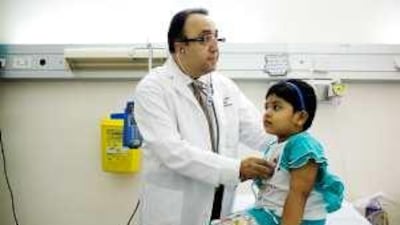ABU DHABI // Around 90 per cent of the injuries that bring children to one of the biggest paediatric emergency departments in the UAE could easily have been prevented, a leading doctor says. "There is no need for these children to die or get injured," said Dr Taisser Atrak, chairman of the paediatric department and chief of neonatology at Mafraq Hospital in Abu Dhabi.
"We are trying to teach people how to prevent deaths and injuries by doing simple things like using car seats or locking away medication in the house." Hundreds of children arrive at the emergency room at the hospital each month. Many of those who have suffered injuries are treated and discharged but up to 10 children a month need to be admitted. The most common cause of injury, about 60 per cent of the total, is car accidents.
The Mafraq Hospital Children's Safety Centre was set up by Dr Atrak and his team six months ago, and has since launched a number of successful programmes that have reduced the number of deaths caused by unintentional injuries. One of the most popular schemes was the distribution of 750 car seats to families leaving the hospital with newborn babies. Dr Atrak estimated that only 20 per cent of the population in the UAE use proper safety restraints, including seat belts and child seats, for their children.
Abu Dhabi Police figures showed that 3,477 people under the age of 17 were involved in road accidents between 2004 and 2008. As well as providing the free seats, medical staff use a "car seat challenge" test to make sure any baby born more than three weeks early is fit to use the seat. They also give the parents written and pictorial instructions on how to use it. "We take the lead in community outreach programmes," Dr Atrak said. "Others do blood pressure and cholesterol tests now and then but this is unheard of in the Middle East."
Another common incident which the emergency staff have to deal with is accidental poisoning. Children are often admitted after ingesting medication, vitamin pills or even cleaning products. The Health Authority - Abu Dhabi's Poison and Drug Information Centre recently revealed that hundreds of people, many of them children, are accidentally poisoned by common household and workplace products each year. The centre has launched a study into the labelling and toxicity of household products available across the UAE. Dr Atrak, who worked in the US for more than 20 years and is certified by the American Board of Paediatrics, says he is using many of the programmes in the US to help improve child safety here. One of these is the PedFACTS scheme developed by the American Academy of Paediatrics. It teaches caregivers and teachers what to do if a child is seriously ill or injured. It has begun hosting classes to train nannies in basic first aid and cardiopulmonary resuscitation (CPR). "We will be going into schools to provide the courses," Dr Atrak said. "This is ideal as they are all together. As well as the basic course, we have added and altered parts based on the culture here."
Already, any families identified as having high-risk babies, such as premature babies, are receiving CPR training. They are provided with videos and given one-on-one training using dummy dolls. "This isn't done anywhere else in the Middle East," Dr Atrak said. "We have had such a positive response from families; some of them who we do not identify as high-risk have come to us and asked for the training." So far more than 100 families have received the training and been certified. Dr Atrak, a father of three, is also working closely with the Health Authority - Abu Dhabi (HAAD) to expand the hospital's work across the emirate. One of the topics under discussion is expanding the first aid training to school bus drivers. "From my own experience as a father, there are no policies or procedures in place. For example, in the US all the buses have to be an ugly yellow and the driver has to put up a sign at the back of the bus saying it is empty after he has checked the whole bus." Dr Atrak said he was working with HAAD to try to introduce similar policies in the UAE. In April 2008 an Indian boy, Aatish Shabin, died when he was locked in a bus that carried him to kindergarten in Abu Dhabi. Last month four-year-old Aiman Zeeshanuddin died in similar circumstances on a private bus taking her to school in Musaffah. The children's safety centre is already distributing leaflets on the dangers of leaving children in hot cars, even for short periods of time, as the number of children admitted with dehydration goes up in the summer months. Angela Ansell, assistant director of nursing and maternal child health services, said there was a lack of legislation enforcing proper safety measures in the UAE compared with that of countries such as the US or UK. "In other countries there is more legislation, but here there is not as much so there is not as much awareness," she said. "We are trying to target prevention rather than cure. It is heartbreaking to see these children being brought into the hospital for things that could easily be prevented. Children come in in dire conditions or worse." Omana Jacob, the unit manager of the Neonatal Intensive Care Unit, said the safety programmes had all been received positively as it was not a lack of care, but simply a lack of awareness that led to many of the unintentional injuries. "The awareness among the parents is very minimal here and they have just never thought of safety that way," she said. "When we do explain things to them, it clicks for them and they want to learn more." munderwood@thenational.ae

